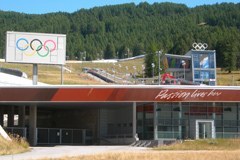News
Next generation to bear risk of Winter Olympics
Dec 12, 2012
/
alpMedia
The Swiss canton of Graubünden wants to hold a "sustainable" Winter Olympics in 2022. While the many open questions regarding the candidacy have stirred passions in Switzerland, Munich's candidacy is not quite so controversial. But time is pressing.

Image caption:
Olympic stadium in Torino: The next generation will have to pay for the economic and ecological effects of the Olympic Games. © Francesco Pastorelli
"The elite in Graubünden have talked themselves into an Olympic frenzy", says Stefan Grass, head of the Graubünden Committee representing those critical of the Olympics. But the people will not be fooled, even if few will declare their opposition publicly. "Many will quietly and secretly vote 'No' on 3 March." This is the date on which the citizens of the canton decide on a contribution of 300 million francs for the 2022 Winter Olympics - one third of the canton's funds. According to a survey, at present those for and against are, at 43% each, equally divided. However, a majority in Davos-Prättigau, one of the two sites selected, has expressed its disapproval. Environmental associations are also critical and many have filed objections with the Federal government, among them CIPRA Switzerland. Executive director Christian Lüthi says: "It is an illusion to think that we can convince the International Olympic Committee with the idea of sustainable Games, as the proponents would have us believe."
In Germany the debate is nowhere near as passionate, neither in the media nor in parliament. The German Olympic Sports Confederation (DOSB) wants to obtain the agreement of the population before any new application. All political Parties and levels - municipalities, federal states, federal government - should first make a binding declaration on the issue. The DOSB will only make its final decision following the Bavarian state parliamentary elections and national elections in September 2013, as well as after the citizens' decision due on 10 November 2013. The application would then have to be submitted to the International Olympic Committee four days later. Furthermore, the financial backing is lacking - which might be difficult to obtain in an election year. A citizens' movement is currently collecting signatures on political grounds for a petition to hold a referendum. Up to now it has altogether 6,000, with a further 29,000 signatures required by 15 January 2013.
In Switzerland the necessary financial backing is present: the Swiss Federal Council wishes to contribute one billion francs to the total budget of 4.5 billion, while the Graubünden parliament has recently approved the cantonal contribution of 300 million francs, to be voted on in March. Experience shows that the budget will not be sufficient - and who will then be responsible for the deficit? The Federal and Cantonal governments have waved such considerations aside; this is a matter for the Games Association, which is organised under private law. But its members include the federal, cantonal and municipal authorities. In other words, the taxpayers - which means that the next generation will have to pay.
Source and further information: www.olympia-nein.ch/go/index.php (de), www.baspo.admin.ch/internet/baspo/de/home (de/fr/it), http://nolympia2018.ludwighartmann.de/ (de), www.cipra.org/de/alpmedia/news-de/4705/ (de/fr/it/sl)
In Germany the debate is nowhere near as passionate, neither in the media nor in parliament. The German Olympic Sports Confederation (DOSB) wants to obtain the agreement of the population before any new application. All political Parties and levels - municipalities, federal states, federal government - should first make a binding declaration on the issue. The DOSB will only make its final decision following the Bavarian state parliamentary elections and national elections in September 2013, as well as after the citizens' decision due on 10 November 2013. The application would then have to be submitted to the International Olympic Committee four days later. Furthermore, the financial backing is lacking - which might be difficult to obtain in an election year. A citizens' movement is currently collecting signatures on political grounds for a petition to hold a referendum. Up to now it has altogether 6,000, with a further 29,000 signatures required by 15 January 2013.
In Switzerland the necessary financial backing is present: the Swiss Federal Council wishes to contribute one billion francs to the total budget of 4.5 billion, while the Graubünden parliament has recently approved the cantonal contribution of 300 million francs, to be voted on in March. Experience shows that the budget will not be sufficient - and who will then be responsible for the deficit? The Federal and Cantonal governments have waved such considerations aside; this is a matter for the Games Association, which is organised under private law. But its members include the federal, cantonal and municipal authorities. In other words, the taxpayers - which means that the next generation will have to pay.
Source and further information: www.olympia-nein.ch/go/index.php (de), www.baspo.admin.ch/internet/baspo/de/home (de/fr/it), http://nolympia2018.ludwighartmann.de/ (de), www.cipra.org/de/alpmedia/news-de/4705/ (de/fr/it/sl)



